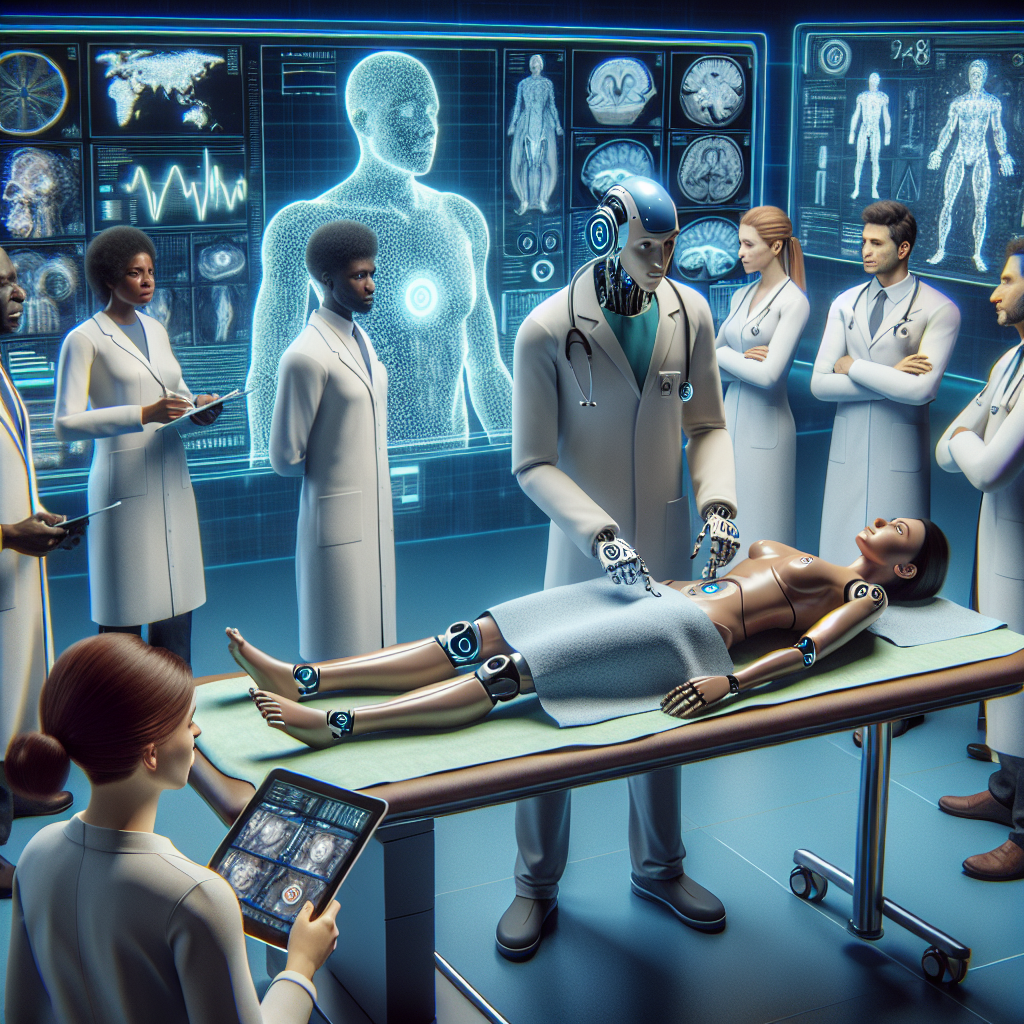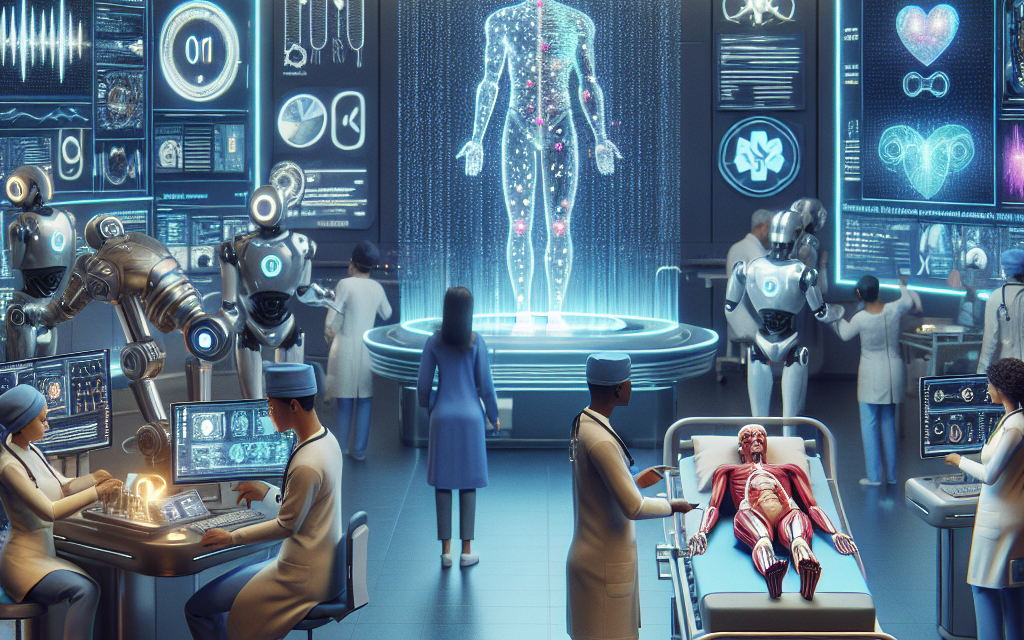Revolutionizing Healthcare: AI’s Impact on Diagnosis and Treatment

The integration of artificial intelligence (AI) into healthcare is transforming the landscape of diagnosis and treatment. With its ability to analyze vast amounts of data quickly and accurately, AI is poised to revolutionize how medical professionals approach patient care. This article explores the multifaceted impact of AI on healthcare, focusing on its role in diagnosis, treatment, patient management, and the ethical considerations that accompany its use.
The Role of AI in Medical Diagnosis
AI’s ability to process and analyze large datasets has made it an invaluable tool in medical diagnosis. By leveraging machine learning algorithms, AI systems can identify patterns and anomalies in medical images, lab results, and patient histories that might be missed by human practitioners.
Enhancing Radiology with AI
Radiology is one of the fields where AI has made significant strides. AI algorithms can analyze medical images such as X-rays, MRIs, and CT scans with remarkable accuracy. For instance, AI systems have been developed to detect early signs of diseases like cancer, often with greater precision than human radiologists.
One notable example is the use of AI in mammography. Studies have shown that AI can reduce false positives and false negatives in breast cancer screening, leading to earlier and more accurate diagnoses. This not only improves patient outcomes but also reduces the emotional and financial burden of unnecessary procedures.
AI in Pathology
Pathology, the study of disease through the examination of organs, tissues, and bodily fluids, is another area where AI is making a significant impact. AI-powered digital pathology platforms can analyze tissue samples with high precision, identifying cancerous cells and other abnormalities more quickly than traditional methods.
For example, AI algorithms can assist pathologists in diagnosing diseases like prostate cancer by highlighting suspicious areas in tissue samples. This not only speeds up the diagnostic process but also enhances the accuracy of diagnoses, leading to better patient outcomes.
Predictive Analytics in Diagnosis
AI’s predictive analytics capabilities are transforming how diseases are diagnosed. By analyzing patient data, including genetic information, lifestyle factors, and medical history, AI can predict the likelihood of developing certain conditions. This allows for earlier intervention and personalized treatment plans.
For instance, AI models have been developed to predict the onset of diseases like diabetes and cardiovascular conditions. By identifying at-risk individuals, healthcare providers can implement preventive measures, reducing the incidence and severity of these diseases.
AI in Rare Disease Diagnosis
Diagnosing rare diseases can be challenging due to their low prevalence and complex symptoms. AI is helping to bridge this gap by analyzing vast amounts of medical literature and patient data to identify potential diagnoses for rare conditions.
AI platforms like Face2Gene use facial recognition technology to assist in diagnosing genetic disorders with distinct facial features. By comparing patient photos with a database of known conditions, AI can suggest possible diagnoses, aiding clinicians in their decision-making process.
Case Study: AI in COVID-19 Diagnosis
The COVID-19 pandemic highlighted the potential of AI in rapid diagnosis. AI algorithms were developed to analyze chest CT scans and X-rays, identifying COVID-19-related lung abnormalities with high accuracy. This enabled faster diagnosis and triage of patients, improving the efficiency of healthcare systems during the crisis.
Moreover, AI-driven chatbots and virtual assistants were deployed to screen patients for COVID-19 symptoms, reducing the burden on healthcare facilities and providing timely information to the public.
AI-Driven Treatment Innovations
AI is not only transforming diagnosis but also revolutionizing treatment approaches. By personalizing treatment plans and optimizing drug development, AI is enhancing the effectiveness and efficiency of medical interventions.
Personalized Medicine and AI
Personalized medicine aims to tailor treatment plans to individual patients based on their unique genetic makeup, lifestyle, and medical history. AI plays a crucial role in this approach by analyzing vast amounts of data to identify the most effective treatments for each patient.
For example, AI algorithms can analyze genomic data to identify genetic mutations associated with specific diseases. This information can guide the selection of targeted therapies, improving treatment outcomes and reducing adverse effects.
AI in Drug Discovery
The drug discovery process is notoriously time-consuming and expensive. AI is streamlining this process by analyzing biological data to identify potential drug candidates more quickly and accurately than traditional methods.
AI platforms like Atomwise use deep learning to predict the binding affinity of small molecules to target proteins, accelerating the identification of promising drug candidates. This not only reduces the time and cost of drug development but also increases the likelihood of discovering effective treatments for complex diseases.
Optimizing Treatment Plans with AI
AI is enhancing treatment planning by analyzing patient data to identify the most effective interventions. For instance, AI algorithms can predict patient responses to different treatments, allowing healthcare providers to select the most appropriate options.
In oncology, AI is being used to optimize radiation therapy plans by analyzing tumor characteristics and patient anatomy. This ensures that radiation is delivered precisely to the tumor while minimizing damage to surrounding healthy tissue, improving treatment outcomes and reducing side effects.
AI in Robotic Surgery
Robotic surgery is another area where AI is making significant contributions. AI-powered robotic systems can assist surgeons in performing complex procedures with greater precision and control.
For example, the da Vinci Surgical System uses AI to enhance the surgeon’s capabilities, providing real-time feedback and guidance during surgery. This not only improves surgical outcomes but also reduces recovery times and complications for patients.
Case Study: AI in Chronic Disease Management
Chronic diseases like diabetes and hypertension require ongoing management to prevent complications. AI is playing a crucial role in this area by analyzing patient data to provide personalized recommendations and interventions.
For instance, AI-powered apps can monitor blood glucose levels in diabetic patients, providing real-time feedback and alerts to help them manage their condition more effectively. This not only improves patient outcomes but also reduces the burden on healthcare systems by preventing costly complications.
AI in Patient Management and Care
AI is transforming patient management and care by improving communication, enhancing patient engagement, and streamlining administrative processes. This not only improves the patient experience but also increases the efficiency of healthcare systems.
AI-Powered Virtual Assistants
AI-powered virtual assistants are revolutionizing patient communication by providing timely information and support. These virtual assistants can answer patient queries, schedule appointments, and provide medication reminders, improving patient engagement and adherence to treatment plans.
For example, AI chatbots are being used in telemedicine platforms to triage patients and provide initial consultations. This not only reduces the burden on healthcare providers but also ensures that patients receive timely care and support.
AI in Remote Patient Monitoring
Remote patient monitoring is becoming increasingly important in managing chronic





